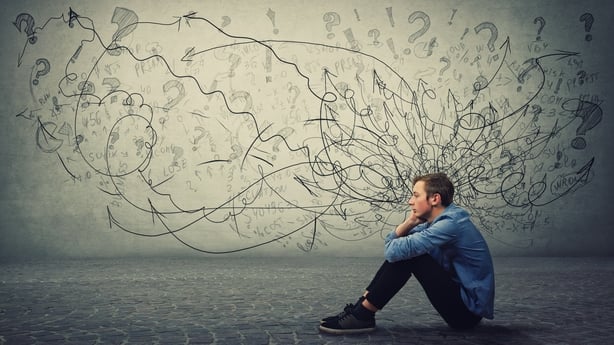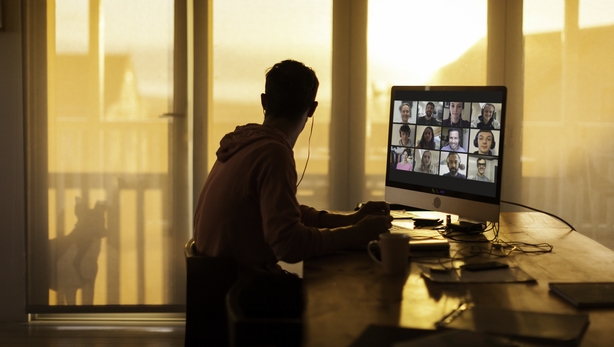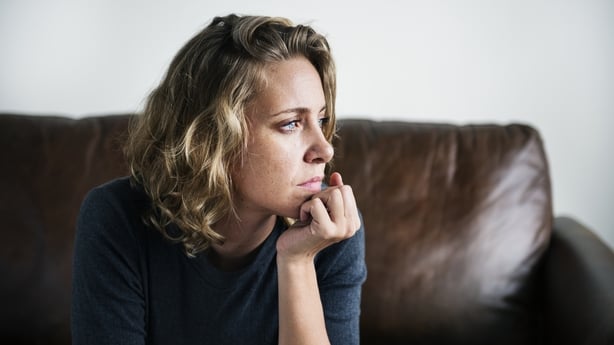The pandemic has meant young people have lost years of their lives and are extremely anxious and stressed
Much has been written and said already about the impact of the Covid-19 pandemic on our mental health. One of the hidden side effects of this is emotional distress and Dr Ann-Marie Creaven from the University of Limerick and mental health specialist Dr Harry Barry recently joined the Today With Claire Byrne show on RTÉ Radio One to discuss this topic. (This piece includes excerpts from the conversation which have been edited for length and clarity - full discussion below).
Barry said it was important to clarify the difference between emotional distress and mental illness. "Emotional distress is the distress we feel when we face some life crisis situation, for example, Covid, plus or minus the arrival in our lives of toxic stress, severe anxiety, or clinical depression. With Covid, you could probably add in grief and trauma, but we'll particularly focus in on distress, anxiety, and depression.
"I think Covid has created huge amounts of hidden distress because, particularly for our young people, there's enormous difficulties with loneliness. There's all these difficulties of people who have struggled to bury loved ones, cope with the illness, cope with unemployment, cope with technology, cope with all the difficulties at home, coping with finances. And young people have lost years of their lives and are extremely anxious and stressed."

Creaven believes emotional distress is "more than simply experiencing negative emotions. It's being in a negative emotional state, for example, feeling sad, lonely, or angry, but also feeling strongly that this is not a comfortable emotional state for you, or that it's too much for you to handle. There are times in our lives where we experienced sadness, for example, after bereavement, and that's very normal. We might experience sadness, but we'll be able to sit with it because it's such a universal experience, and we won't try lift ourselves out of it.
"But other times, we'll experience these negative emotions like sadness, and we want to dig ourselves out of it, and we struggle to do that, or we find our negative emotions interfering with our day-to-day lives. That for me is emotional distress, when you have these negative emotions, but they're persistent, they disrupt your everyday functioning, and you struggle to really get past them."
According to Barry, there are there are physical and psychological symptoms. "The physical symptoms, we're exhausted all the time. We're not sleeping properly, waking up constantly feeling unrefreshed. We're constantly on edge, very tired but wired, maybe a lot of mouth ulcers and cold sores. Maybe we're feeling constantly a bit flat in mood, our cognition like our concentration, memory, decision-making is all down. We're feeling maybe hopeless, de-motivated, and lots of others are having these Covid days where we just feel, what's the point in going on? And I'm hearing that more and more and more all the time."

"Then, there are the unhealthy behaviours. These include, says Barry, "drinking too much, overusing technology, going to bed too late, spending too much time in our Netflix and social media, fighting with our loved ones, not taking enough exercise, eating rubbish, drinking too much. All these are warning signs that we're just getting overrun. There's so many people up and down the country who can relate to feeling like this every day. And it's really important that we recognise and talk about it, that we just don't push it under the cover, which we are great at doing, because this is going to have a lot of impact on our mental health."
Anxiety is another issue to be deal with. "Anxiety can come in a couple of different forms", says Creaven. "I think we will see issues with social anxiety come to the fore when things are settled down a bit. People who would have had issues with social anxiety previously probably haven't been stretched in social situations. Those of us who haven't had issues with social anxiety, we're very rusty on the social skills front so situations that wouldn't have caused anxiety before might cause anxiety in future. I do think we particularly need mental health supports to be resourced in relation to anxiety and especially for social anxiety.
"I used to actually love teaching large classes in UL. I had some very large classes. We used to have the crack in the big lecture theaters. But if you've asked me now to walk in and see 300 faces smiling at me, I would struggle with that, and I have no history of social anxiety. So I think I'll need to build up to that. When things are opening up a bit and we have opportunities to meet, I will probably meet people one at a time. I won't want to meet a large group of people. I might meet people around an activity like a walk, so we have something to do, because it's not much to be talking about.

"These are steps I'll take myself to reintegrate with the social world and I'm someone who would quite miss the social world that we had before Covid. For people who do have difficulties, I think it's only normal to have a transitional period where we really need to think about what we feel comfortable with and how we can manage our feelings about social settings again."
It's important that we accept it's the situation and not us that's abnormal. "It's OK to feel like crap sometimes, which we all do", says Barry. "I think it's really important that we work hard on the lifestyle changes. Make sure you get enough sleep. Do the alcohol detox. Don't drink from Monday to Friday. Try and get out for your bit of exercise. Try and for example, limit your technology. Shut down technology. Stop answering all your emails.
I'm very concerned that we're getting more and more institutionalised as a result of this pandemic
"We don't talk about this enough. About how to really look after your own physical and mental health, and the health of your relationship. Because if you can look after your own physical, mental health, and the health of the person you love, that will go a huge amount towards resolving this. And I think if there are particular problems and difficulties, write them down, try and look at solutions to issues that are causing you stress.
"Just don't put your head in the sand, and look for help. Ring people, ask people for assistance. I also think it's really important that we put these positive targets out there. I've got a bucket list of things I want to do, and I hope to God, all of you have, because hope is the antidote to despair, and find meaning in helping others. Try and help others will be a great way of bringing you through this, and don't be afraid as well to do something different, try and break out of the cycle. I'm very concerned that we're getting more and more institutionalised as a result of this pandemic, and it's spreading right across all layers of society and that's something we're going to really have to face."
Hear the discussion in full below
We need your consent to load this rte-player contentWe use rte-player to manage extra content that can set cookies on your device and collect data about your activity. Please review their details and accept them to load the content.Manage Preferences

